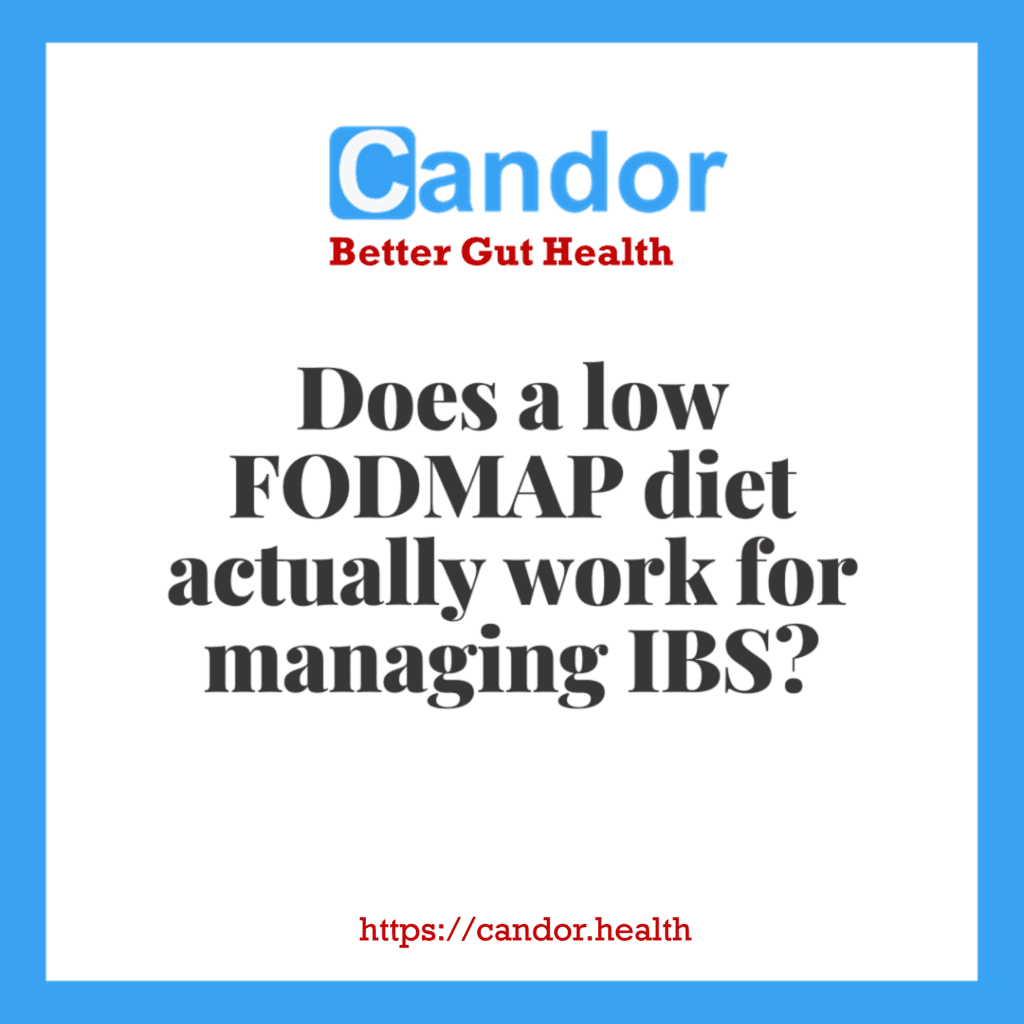
Short answer – it depends, based on each individual’s reaction to various food combinations.
Long answer – there is considerable interest in answering the question – does low FODMAP diet work for IBS – as FODMAP intake, specifically fructose, has increased in Western diets over the past three decades owing to increased availability of fruits and concentrated fruit juices and the extensive use of high fructose corn syrup in a wide variety of processed foods and beverages ranging from soft drinks, to yoghurts and breads. The low FODMAP diet was developed based on the poor absorption of the short-chain carbohydrates in the small intestine which causes gas production and increases intestinal osmolality due to their rapid fermentation and osmotic action.
When a person knows the difference between high and low FODMAP foods, it makes it more straightforward for them to incorporate them into a diet. Both categories contain a wide range of food groups. It is best to speak with your physician or dietitian before starting a low FODMAP diet. This diet plan is not for long-term adoption, as it eliminates some essential, nutrient-rich foods.
A low FODMAP diet involves three phases:
- Elimination: Typically, 3–8 weeks depending on a person’s response to the diet, when a person eliminates all high FODMAPs.
- Re-introduction: Once symptoms have subsided or improved, get individual FODMAP food items into the diet, usually one item about every 3–7 days. This can help identify trigger foods.
- Maintenance: Return to a regular diet, limiting only the FODMAP foods that cause IBS symptoms.
A low FODMAP diet may help improve symptoms of IBS, but not everyone responds well to this diet. Assess benefits and risks with your physician before you start.
Numerous studies have backed the effectiveness of low FODMAP diets in managing IBS symptoms, though it remains a topic of debate. Experts have cautioned that the diet may not suit everyone with IBS, citing the following potential drawbacks:
- Complexity: Understanding, learning, and following the diet can be challenging.
- Restrictive Nature: The diet’s restrictions may increase the risk of disordered eating in some individuals.
- Long-Term Adherence: Maintaining the diet over time can be difficult due to its restrictive nature.
- Potential Issues: Incorrect implementation may lead to nutritional deficiencies and changes in the gut microbiota.
- Lack of Standardization: Confusion can arise due to a lack of clear guidelines and food labeling.
- Cost: It may incur additional expenses.
- Aggravation: In some cases, symptoms like constipation may worsen.
See our article on the risks of low FODMAP diet.
Nonetheless, most researchers agree that a low FODMAP diet can be beneficial for some individuals with IBS if followed under the guidance of a medical professional, considering the potential risks. Experts have suggested that a low FODMAP diet might not only help manage IBS symptoms but also benefit other gastrointestinal conditions and possibly unrelated health issues. Still, they emphasized the importance of following it cautiously and only with medical supervision.
Some researchers have supported the idea that a low FODMAP diet can alleviate gastrointestinal symptoms and enhance the quality of life for people with IBS compared to other diets. However, further investigation is needed to assess its long-term impact on nutrient intake and gut microbiome health.
Ongoing research continues to explore the use of the low FODMAP diet for IBS. While some studies show promising results in reducing symptoms for individuals with IBS and other gastrointestinal disorders, it may not suit everyone and may not be effective for all digestive-related conditions.
References:
- Barrett JS (March 2017). “How to institute the low-FODMAP diet”. Journal of Gastroenterology and Hepatology (Review).
- Bellini, M., et al. (2020). “Low FODMAP diet: Evidence, doubts, and hopes.” Nutrients.
- Gibson PR (March 2017). “History of the low FODMAP diet”. Journal of Gastroenterology and Hepatology (Review).
- Halmos, E. P., et al. (2019). “Controversies and reality of the FODMAP diet for patients with irritable bowel syndrome.” Journal of Gastroenterology and Hepatology.
- Gibson PR (March 2017). “History of the low FODMAP diet”. Journal of Gastroenterology and Hepatology (Review).



























